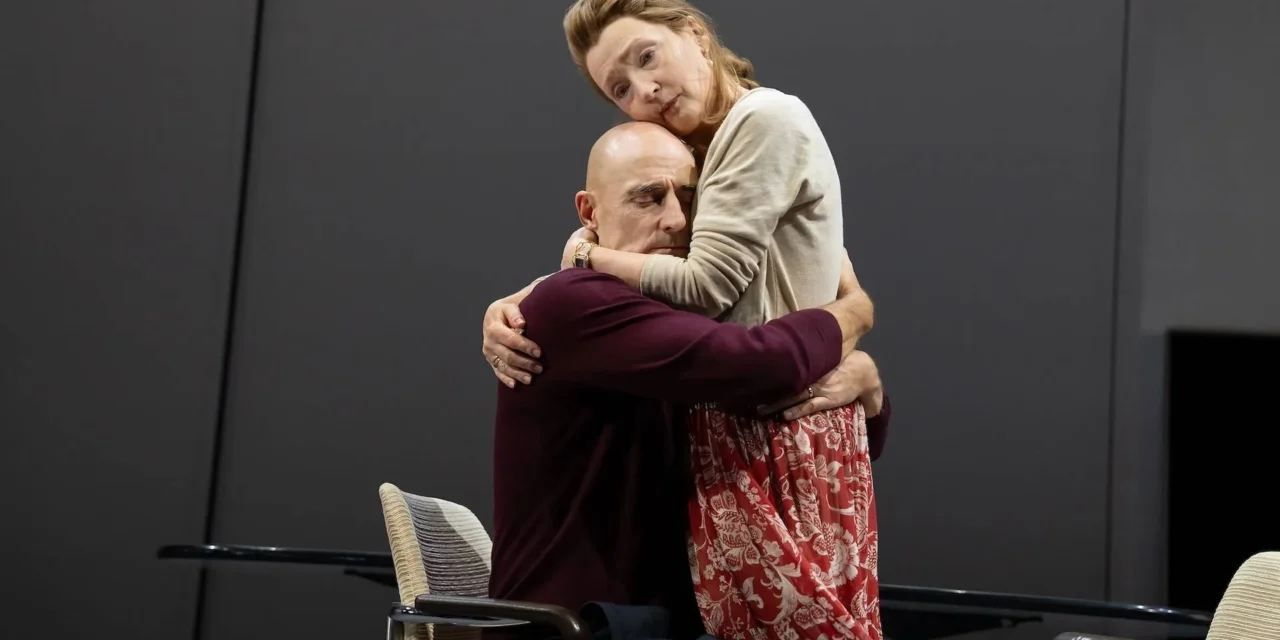Review by Samuel L. Leiter.
In 1959, Elmer Rice wrote Cue for Passion, a Broadway play that adapted Shakespeare’s Hamlet into contemporary terms, emphasizing the Oedipal complex of its central character, Tony Burgess. Now, British wunderkind Robert Icke (Oresteia, 1984) has “created,” as the program says, a widely admired—but, for this reviewer, somewhat problematic—modern adaptation of Sophocles’ Oedipus Rex. Icke’s version, now at Studio 54, recasts the tragedy as a political drama in which Oedipus’ desire for his mother—or someone old enough to be her—is graphically explicit, bringing Freudian theory directly to its source. Many plays have reimagined classics to explore social, political, or psychological themes; think of all the plays based on Sophocles’ Antigone.
Icke’s Oedipus is a new play rather than an updated translation. It premiered in 2018 at the International Theater, Amsterdam, appeared at the Edinburgh International Festival in 2019, and later ran in a sold-out West End engagement at London’s Wyndham Theatre in 2024. It stars two unforgettable British actors from the London production as Oedipus and Jocasta, Mark Strong and Lesley Manville, whose sizzling performances alone make the production worth seeing. Manville won an Olivier for hers.
The action unfolds in Oedipus’ campaign headquarters, where he is a popular progressive running for—and expected to win big—the unnamed country’s highest office. Characters retain their Greek names but speak colloquial, often profane English, and include figures not just from Oedipus Rex but from other tragedies involving the Theban king’s family. From Oedipus Rex, we meet Oedipus; his wife, Jocasta; Creon (John Carroll Lynch), Jocasta’s brother and Oedipus’ campaign manager; Teiresias (Samuel Brewer), the blind prophet, here a homeless cultist; and the Driver (Teagle F. Bougere), roughly analogous to Sophocles’ Shepherd or Herdsman. The functions of the chorus are absorbed by other roles.
Chief among these are Lichas (Ani Mesa-Perez), an assistant; Corin (Bhasker Patel), an old family retainer; Merope (Anne Reid), the old woman who raised Oedipus and whom he believes to be his mum; Antigone (Olivia Reis), Oedipus’ outspoken daughter; and his squabbling sons, Eteocles (Jordan Scowes) and Polyneices (James Wilbraham). Ismene is simply omitted. The retention of the classical Greek names can feel slightly awkward in this present-day world, although calling your Hamlet character Tony Burgess is not without its drawbacks.
The essential story—a proud leader discovering during a moment of great tension that he killed his father, married his mother, and was raised by others—remains intact, though psychology now replaces divinity as the driving force. Here it serves to underline the disconnect between the public perception of a candidate’s integrity and the oft-hidden reality behind that perception.

It unfolds on Hildegard Bechtler’s cold, white-walled set, with glass-enclosed rooms, large panel-like doors, modern office furnishings, TV screens, and a prominent digital clock counting down to the end of voting. Natasha Chivers’ lighting and Wojciech Dziedzic’s costumes are elegant and effective.
That clock, however, creates minor confusion, as it is easy to conflate the countdown with the play’s two-hour, intermissionless running time. Those familiar with the story may find themselves quietly calculating when Jocasta will make her fatal choice (Chekhov’s rule hints at its inescapability) or Oedipus will try a DIY on his cataracts. As the post-curtain lines at the restrooms reveal, 120 minutes is a long time to hold it in.
Icke seems intent on creating a suspenseful drama in which truth and falsehood clash until the unavoidable conclusion. Oedipus is portrayed as a commanding alpha male, obsessively proud of his integrity and devotion to his family—a commitment highlighted when he embraces Polyneices after the boy comes out as gay. Yet he is also a fierce hothead, suggesting that pride goeth before his fall: when Teiresias suggests that Creon will be the new leader, Oedipus lashes out furiously, refusing to consider any alternative, however plausible. Strong’s Oedipus is stunningly potent, but even he cannot fully reconcile the character’s extremes as effectively as the larger-than-life style of Sophocles’ original allows.
Oedipus remains compelling, though often for unintended reasons. For newcomers, the unraveling of a man blind to fate may be riveting; for me, the principal suspense lay in waiting to see what Icke’s next clever gimmick would be for altering the ancient drama to a contemporary context. His strategies sometimes feel forced, though, particularly those surrounding Merope, played outstandingly by 90-year-old Anne Reid, who repeatedly tries to reveal something vitally important to Oedipus but is consistently rebuffed because he’s too busy. The device eventually becomes tiresome, just as a brief epilogue seems unnecessary.
Modernizing Sophocles does occasionally inspire interesting dramatic payoffs, however, such as Oedipus’ rebuttal of accusations against his citizenship status by announcing, in a video prologue, his intention to make his birth certificate public. Like several other self-aware comments, it gets a laugh. And one may wish to ponder the dilemma of a political leader who cares how his private life may be the opposite of what the public perception of it is, even through no fault of his own. Yet other elements—most notably Oedipus’ method of self-punishment—strain credulity within this setting and are difficult to reconcile with the self-assured, if intensely driven, man we have have spent two hours watching.
Mark Strong, tall, trim, and bullet-headed, is a striking Oedipus; at sixty-two, he convincingly plays a charismatic, 52-year-old leader, although the play requires him to shout angrily a bit too much. Lesley Manville, 69, makes her stirringly believable Jocasta equally important. With Jocasta said to have been 13 when old Laius impregnated her, she makes less obvious the age gap between her and her unwitting son. She is credible even when she must strip to her underwear, revealing an enviously lissome figure. Both actors deserve every accolade: Strong for his fiery, vulnerable, yet imposing performance; Manville for her exceptional emotional range, moving from confident political partner and bedfellow to a woman confronting the unimaginable and struggling to dismiss the inevitable.
Robert Icke, at 38, has cemented his status as one of the English theater’s most imaginative directors. Each of his four limited-run productions at the Park Avenue Armory were major events, and Oedipus—ambitious, imperfect, provocative, and indelible—sticks in the mind long after the curtain falls.
Studio 54
254 W. 54th Street, NYC
Through February 8
Photos by Julieta Cervantes.
Headline Photo: Mark Strong and Lesley Manville.


